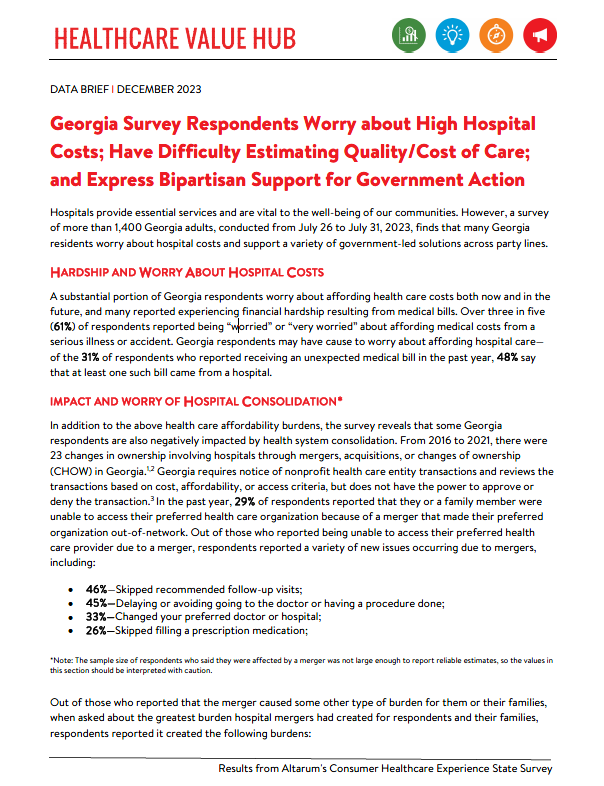Georgia Survey Respondents Worry about High Hospital Costs; Have Difficulty Estimating Quality/Cost of Care; and Express Bipartisan Support for Government Action
Hospitals provide essential services and are vital to the well-being of our communities. However, a survey
of more than 1,400 Georgia adults, conducted from July 26 to July 31, 2023, finds that many Georgia
residents worry about hospital costs and support a variety of government-led solutions across party lines.
Hardship and Worry about Hospital Costs
A substantial portion of Georgia respondents worry about affording health care costs both now and in the
future, and many reported experiencing financial hardship resulting from medical bills. Over three in five
(61%) of respondents reported being “worried” or “very worried” about affording medical costs from a
serious illness or accident. Georgia respondents may have cause to worry about affording hospital care—
of the 31% of respondents who reported receiving an unexpected medical bill in the past year, 48% say
that at least one such bill came from a hospital.
Impact and Worry of Hospital Consolidation*
In addition to the above health care affordability burdens, the survey reveals that some Georgia
respondents are also negatively impacted by health system consolidation. From 2016 to 2021, there were
23 changes in ownership involving hospitals through mergers, acquisitions, or changes of ownership
(CHOW) in Georgia.1,2 Georgia requires notice of nonprofit health care entity transactions and reviews the
transactions based on cost, affordability, or access criteria, but does not have the power to approve or
deny the transaction.3 In the past year, 29% of respondents reported that they or a family member were
unable to access their preferred health care organization because of a merger that made their preferred
organization out-of-network. Out of those who reported being unable to access their preferred health
care provider due to a merger, respondents reported a variety of new issues occurring due to mergers,
including:
- 46%—Skipped recommended follow-up visits;
- 45%—Delaying or avoiding going to the doctor or having a procedure done;
- 33%—Changed your preferred doctor or hospital;
- 26%—Skipped filling a prescription medication;
*Note: The sample size of respondents who said they were affected by a merger was not large enough to report reliable estimates, so the values in this section should be interpreted with caution.
Out of those who reported that the merger caused some other type of burden for them or their families,
when asked about the greatest burden hospital mergers had created for respondents and their families,
respondents reported it created the following burdens:
- 24%—Added wait time burden when searching for a new provider who is accepting new patients;
- 39%—Added financial burden;
Survey respondents were also asked to share their experiences following hospital consolidation. Selected
responses are listed below in Table 1.
While a small portion of respondents reported being unable to access their preferred health care
organization because of a merger, (54%) reported being somewhat, moderately or very worried about the
impacts of mergers in their health care organizations. When asked about their largest on concern,
respondents reported:
- 23%—I’m concerned I will have fewer choices of where to receive care
- 25%—I’m concerned my doctor may no longer be covered by my insurance
- 27%—I’m concerned I will have to pay more to see my doctor
- 12%—I’m concerned I will have to travel farther to see my doctor
- 13%—I’m concerned I will have a lower quality of care
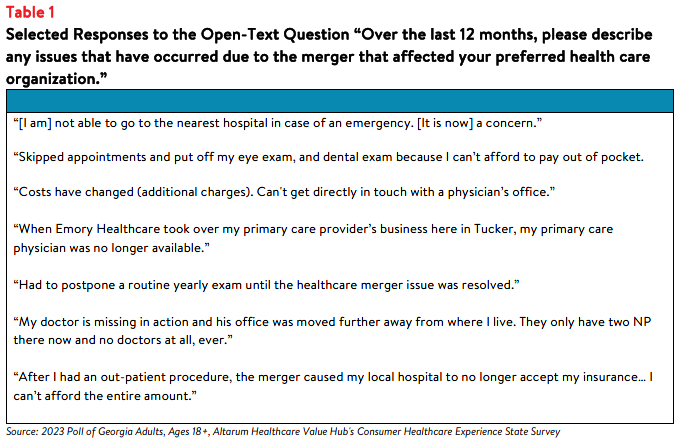
Skills Navigating Hospital Care
Georgia respondents reported fairly high confidence in their ability to know when to seek emergency
care, with 67% reporting that they are very or extremely confident about knowing when to go to the
emergency department versus a primary care provider. However, they are slightly less confident in their ability to find hospital costs and quality information. Fifty-four percent of respondents are NOT confident they can find out the cost of a procedure ahead of time, and many are NOT confident they can find quality ratings for doctors (54%) or hospitals (55%).
Georgia respondents’ lack of confidence may be reflected in the low rates of searching for hospital price
and quality information. Out of all respondents, only 35% tried to find the cost of a hospital stay ahead of
time and 13% needed a hospital stay but did not search for cost information. Out of those respondents
who tried to find hospital cost information or needed a hospital stay, 47% reported finding the
information they were looking for, 27% reported they did not find the information they were looking for,
and 26% did not attempt to find information when they needed a hospital.
Forty-eight percent of all respondents reported that they have tried to find quality information on
hospitals and 16% needed a hospital but did not try to look for quality information. Out of those
respondents who tried to find hospital quality information or needed a hospital stay, 57% were successful
at finding quality information, 19% were unsuccessful and 24% did not attempt to find quality information
when they needed a hospital (see Figure 1). Figure 1 also captures other health care costs integral to
hospital services, including medical tests and primary care/specialist doctor visits.
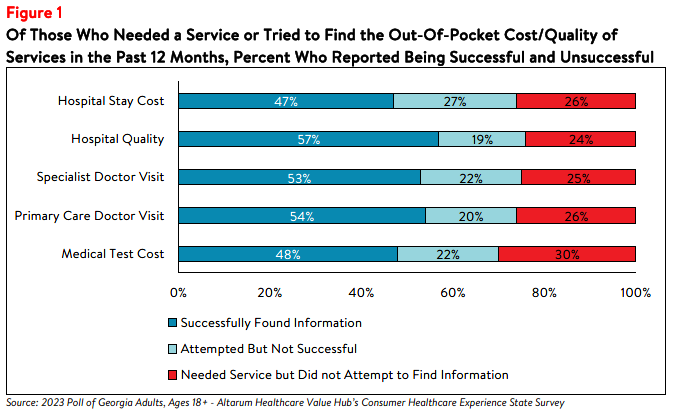
Among respondents who needed a service but did not seek out price or quality information, the most
frequently reported reasons for not seeking information were:
- 34%—Followed their doctors’ recommendations or referrals;
- 29%—Did not know where to look;
- 28%—Looking for information felt confusing or overwhelming;
- 14%—It never occurred to me to look for provider quality or price information; and
- 21%—Did not have time to look.
Notably, few of these respondents reported that out-of-pocket cost or quality were unimportant to them
(10% and 6%, respectively).
Respondents who attempted to find hospital cost or quality information but were unsuccessful faced a
variety of barriers. Among those who were unsuccessful at searching for cost information, respondents
reported that resources available to search for price information were confusing (38%), their insurance
plan or provider/doctor/hospital would not give them a price estimate (32% and 37%, respectively) and
that price information was insufficient (27%). In unsuccessful searches for hospital quality information,
respondents reported that resources available to search for quality information were confusing (26%) and
that the quality information available was not sufficient (17%).
Among those who were successful at finding the cost for a hospital stay or quality information, over half
reported NOT attempting to compare prices or quality between providers (i.e. “shopping”) (see Figure 2).
Still, 87% successfully compared cost of a hospital stay, and 90% successfully compared quality across
hospitals.
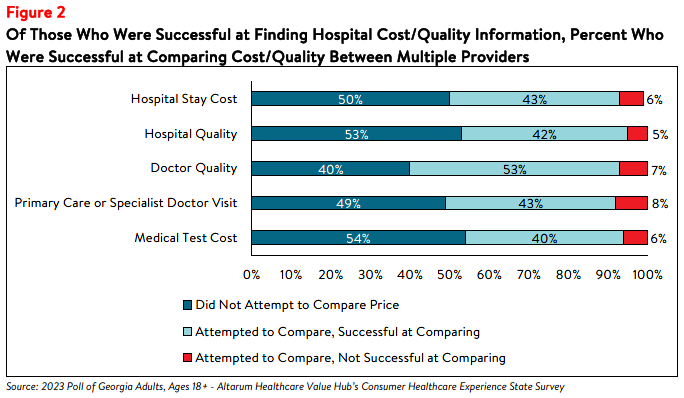
Among those that compared cost or quality information for different services, many reported that the
cost or quality comparison ultimately influenced their choice of which provider to seek care from. Eighty-
seven percent of those who compared primary care or specialist doctor visit costs said the comparison
influenced their choice, as did 87% of those who compared medical test costs and 87% of those who
compared hospital stay costs. Among those who looked for hospital quality information, 87% had their
choice influenced by the information.
Although many of the respondents who sought out hospital price and quality information were ultimately
successful, many respondents never attempted to find this information. Even among those who were
successful at finding hospital cost or quality information, a little over half did not compare prices or
quality between providers (i.e. “shopping”). Respondents identified a variety of barriers to finding and
comparing cost and quality information, including following doctors’ recommendations, confusion over
where or how to find cost or quality information, and providers and insurers not providing cost estimates.
These reasons could also be influenced by this information not being accessible, despite federal price
transparency mandates for hospitals.4
It could also stem from the fact that some consumers don’t view health care as a shoppable commodity,
especially in emergency situations and settings that lack a selection of treatments/providers. Lack of
knowledge of hospital quality and potential costs impedes Georgia residents’ ability to plan for needed
care and budget for the expense of a hospital stay, which can be costly,5 particularly for residents who are
uninsured or under-insured.
Support for "Fixes" Across Party Lines
Hospitals, along with drug manufacturers and insurance companies, are viewed as a primary contributor to high health care costs. When given more than 20 options, those that Georgia respondents most
frequently cited as being a “major reason” for high health care costs were:
- 69%—Drug companies charging too much money
- 69%—Hospitals charging too much money
- 67%—Insurance companies charging too much money
- 57%—Large hospitals or doctor groups using their influence to get higher payments from insurance companies
Georgia respondents strongly endorse several hospital-related strategies, including:
- 89%—Require hospitals and doctors to provide up-front cost estimates to consumers
- 86%—Set standard payments to hospitals for specific procedures
- 86%—Impose price controls on contracts between insurers and health care providers
- 86%—Strengthen policies to drive more competition in health care markets to improve choice and access
Interestingly there is a level of support for some of these strategies across party lines (see Table 2).
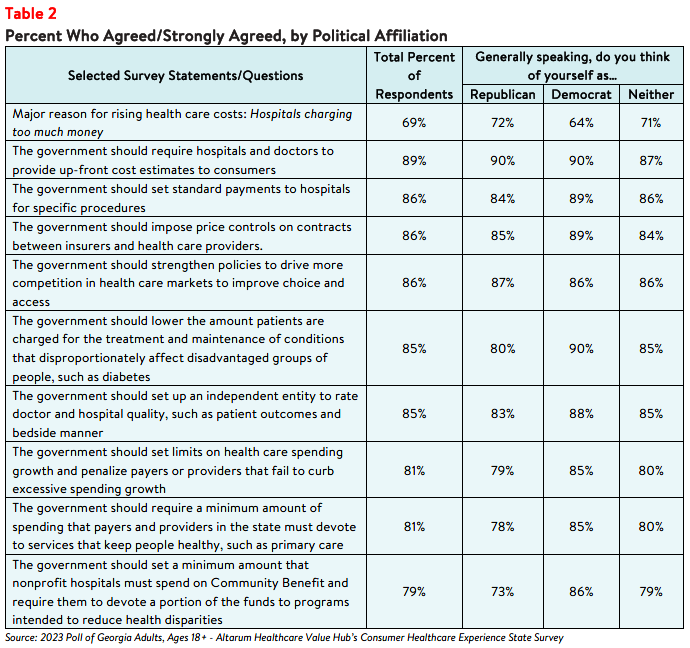
Conclusion
The findings from this poll suggest that Georgia respondents are somewhat motivated when it comes to
searching for hospital cost and quality information to help inform purchasing decisions and plan for a
future medical expense. Still, over half did not search for this information at all, suggesting that effort to
influence consumer shopping through price transparency initiatives may not be effective for everyone.6
It is not surprising that Georgia respondents express strong support for government-led solutions to make
price and quality information more readily accessible and to help consumers navigate hospital care. Many
of the solutions that respondent’s support would take the burden of research and guesswork off consumers, such as standardizing payments for specific hospital procedures, requiring hospitals and doctors to provide consumers cost estimates for certain procedures, and establishing an entity to conduct independent quality reviews. Policymakers should investigate the evidence on these and other policy options to respond to respondents’ bipartisan call for government action.
Notes
-
Centers for Medicare and Medicaid Services. (2023). Hospital Change of Ownership. Retrieved October 4, 2023, from
https://data.cms.gov/provider-characteristics/hospitals-and-other-facilities/hospital-change-of-ownership -
A CHOW typically occurs when a Medicare provider has been purchased (or leased) by another organization. The CHOW results in the transfer of the old owner's identification number and provider agreement (including any Medicare outstanding debt of the old owner) to the new owner…An acquisition/merger occurs when a currently enrolled Medicare provider is purchasing or has been purchased by another enrolled provider. Only the purchaser's CMS Certification Number (CCN) and tax identification number remain. Acquisitions/mergers are different from CHOWs. In the case of an acquisition/merger, the seller/former owner's CCN dissolves. In a CHOW, the seller/former owner's CCN typically remains intact and is transferred to the new owner. A consolidation occurs when two or more enrolled Medicare providers consolidate to form a new business entity. Consolidations are different from acquisitions/mergers. In an acquisition/merger, two entities combine but the CCN and tax identification number (TIN) of the purchasing entity remains intact. In a consolidation, the TINs and CCN of the consolidating entities dissolve and a new TIN and CCN are assigned to the new, consolidated entity. Source: Missouri Department of Health and Senior Services, Change of Ownership Guidelines—Medicare/State Certified Hospice. Retrieved August 23, 2023, from
https://health.mo.gov/safety/homecare/pdf/CHOW-Guidelines-StateLicensedHospice.pdf#:~:text=Acquisitions%2Fmergers%20are%20different%20from%20CHOWs.%20In%20the%20case,providers%20consolidate%20to%20form%20a%20new%20business%20entity. -
The Source on Health care Price and Competition, Merger Review, Retrieved October 4, 2023 from
https://sourceonhealthcare.org/market-consolidation/merger-review/ -
As of January 1, 2021, the Centers for Medicare and Medicaid Services (CMS) requires hospitals to make public a machine-readable file containing a list of standard charges for all items and services provided by the hospital, as well as a consumer-friendly display of at least 300 shoppable services that a patient can schedule in advance. See: https://www.cms.gov/hospital-price-transparency/hospitals
-
According to Health Forum, an affiliate of the American Hospital Association, hospital adjusted expenses per inpatient day in Georgia were $2,147 in 2021, similar to the national average. See: Kaiser Family Foundation, State Health Facts Data: Hospital Adjusted Expenses per Inpatient Day. Accessed October 4, 2023. https://www.kff.org/health-costs/state-indicator/expenses-per-inpatient-day/
-
This survey was conducted after the Centers for Medicare and Medicaid Services’ rule requiring hospitals to publicly display all standard charges for all items and services, as well as shoppable services, in a consumer-friendly format went into effect. However, low compliance from large hospitals indicates that the rule has yet to demonstrate the desired effect. See: Kelly, Susan, “Hospitals Still Fall Short on Price Transparency, Consumer Group Says,” Health care Dive (Aug. 10, 2023). See also: Kurani, Nisha, et al., Early Results from Federal Price Transparency Rule Show Difficulty in Estimating the Cost of Care, Kaiser Family Foundation, (April 9, 2021).
Methodology
Altarum’s Consumer Health care Experience State Survey (CHESS) is designed to elicit respondents’ unbiased views on a wide range of health system issues, including confidence using the health system, financial burden and possible policy solutions.
This survey, conducted from July 26 to July 31, 2023, used a web panel from online survey company Dynata with a demographically balanced sample of approximately 1,500 respondents who live in Georgia. Information about Dynata’s recruitment and compensation methods can be found here. The survey was conducted in English or Spanish and restricted to adults ages 18 and older. Respondents who finished the survey in less than half the median time were excluded from the final sample, leaving 1,473 cases for analysis. After those exclusions, the demographic composition of respondents was as follows,
although not all demographic information has complete response rates:
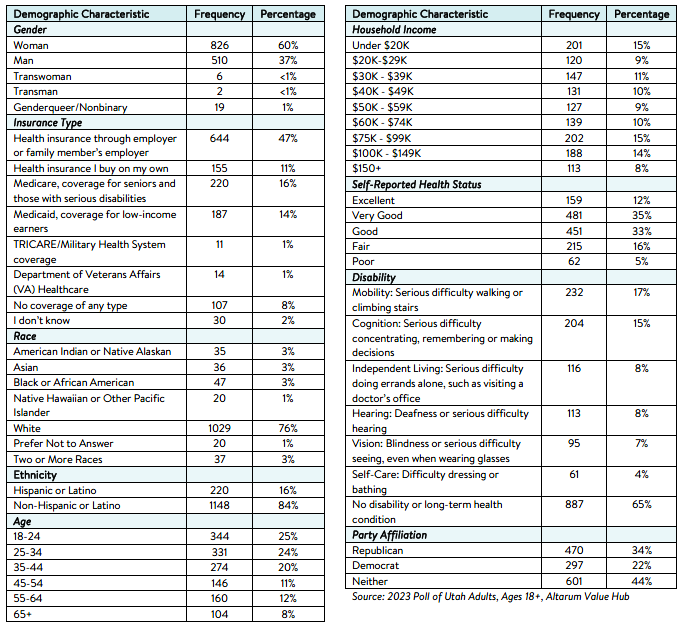
Percentages in the body of the brief are based on weighted values, while the data presented in the demographic table is unweighted. An explanation of weighted versus unweighted variables is available here. Altarum does not conduct statistical calculations on the significance of differences between groups in findings. Therefore, determinations that one group experienced a significantly different affordability burden than another should not be inferred. Rather, comparisons are for conversational purposes. The groups selected for this brief were selected by advocate partners in each state based on organizational/advocacy priorities. We do not report any estimates under N=100 and a co-efficient of variance more than 0.30.


